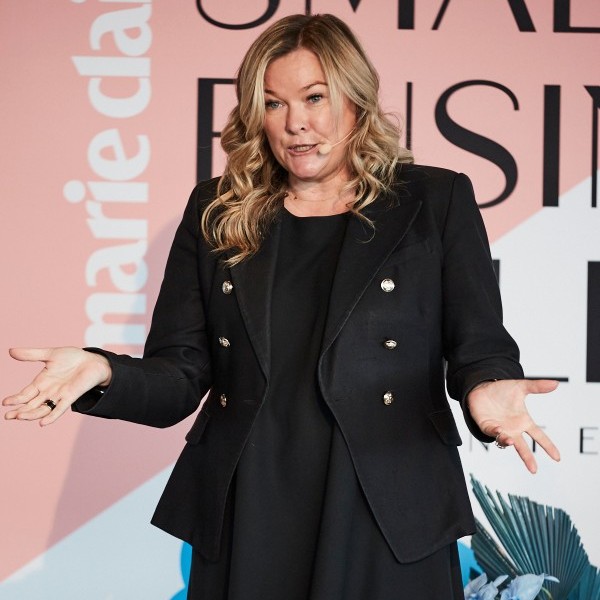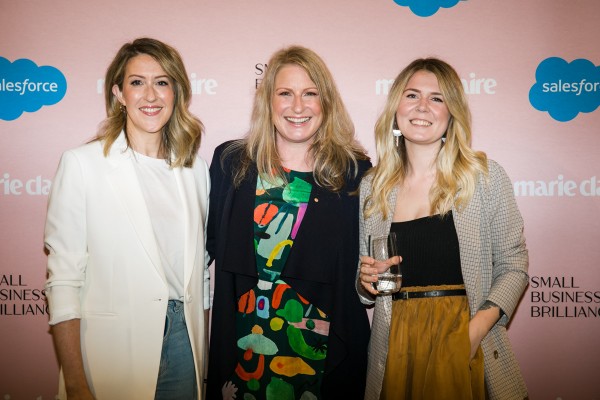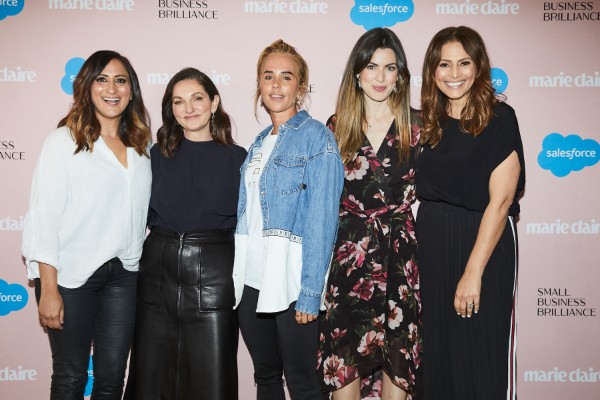It’s much easier to be something when you can see it – and at the Small Business Brilliance Masterclasses we ran in partnership with marie claire in Sydney and Melbourne in early October, seven founders who’ve built successful businesses shared their successes, failures, advice and insights: Expert360’s Bridget Loudon, PE Nation’s Pip Edwards, Sally Obermeder and Maha Corbett of Swiish, St Kilda Mums’ Jessica Macpherson, Code Like a Girl’s Ally Watson, and Adore Beauty’s Kate Morris.
For small business owners, any time away from the business is hard, so to see 300+ women at these breakfast events is inspiring and hammers home just how important it is to show up for the community. There’s never been a more important time for us to invest in and support women, to help them start, scale and succeed. Women don’t get enough venture capital funding – despite recent increases and a spotlight on the issue, that’s still clear. Female entrepreneurs still rate access to capital as their single biggest constraint while men cite hiring the right talent.
Women see nowhere near enough funding to fuel the great innovation we can bring. Just 1% of respondents to our recent Women in Business research, in partnership with marie claire, report venture capital as a source of initial funding, while 83% personally invested in the business.
Crunchbase’s recent ‘Diversity Report’ found that USD $5 billion of venture capital has gone to companies led by a female founder in the first three quarters of 2019, with another USD $15 billion going to companies with male and female founding teams. Sounds great? Sure, but that $5 billion represents just 3% of VC.

We know that diverse thinking reshapes products, services and experiences to better serve our markets, and when women are absent from the table, bad things happen.
Bad things like a disproportionate number of women and children being injured in car crashes in the early days of airbags – as Salesforce ANZ CEO Pip Marlow shared at the Sydney event, the all-male design team had used a dummy the size of the average male body and ended up designing a product fit for use by the average-sized male. We need women at the table when we’re starting businesses, innovating and designing products.
So, here are my favourite four key takeaways for female entrepreneurs from the Salesforce x marie claire Small Business Brilliance masterclasses in Sydney and Melbourne.
1. The reality is very different
“I definitely had visions of sitting in a cafe and being a blogger and traveling the world. I mean, none of that happened,” says Maha Corbett, who co-founded Swiish with her sister Sally Obermeder.
“She didn’t even get to a cafe!” Obermeder said.“The early days were pretty brutal. It was just me, in the garage with my cat. And look, it was pretty lonely. It was pretty depressing,” said Kate Morris, destroying what was left of the Insta-worthy illusion of SMB life – working in cute cafes, popping decals up on the walls of a small office, drinking champagne with a rotating crowd of glamorous business chicks.
“Some days I’d get maybe one or two orders, and I’d pack them up myself and walk them down to the post office at the end of the day in my little granny shopping cart.”

Morris went to Tasmania – “home for a bit” – and spoke with her mum about packing it all in.
“Mum said, ‘Well look, you could give up, but what would you lose if you stuck at it for a little bit longer? What’s the worst thing that could happen?’. And I said, ‘Well, I could be 25 and have no money and no job’.
“She said, ‘Honey, you’re studying an arts degree. So what’s the most logical outcome here?’.”
Jokes aside, Morris did stick with it despite having both good and difficult days. Over the past 20 years, she has built an incredible business in Adore Beauty.
2. Inspiration can come from anywhere
“I was destined for art school,” says Code Like a Girl’s Ally Watson. Unfortunately for destiny, but fortunately for women in STEM, she was rejected by every art school in the country.
“I remember having to just bear that, having to see that rejection and just redirect it,” she said. “So I chose computer science, not because it was something that I was born to do or, you know, my mum was at NASA as an engineer.
“There was nothing that drew me to computer science other than the fact that they had leftover spaces.”
At the beginning of the semester, Watson realised just how few women chose computer science. “It reminded me of the film Legally Blonde – when Reese Witherspoon goes to Harvard. That’s what it felt like for me. And it was really hard because I was definitely behind everyone in the class and that was just something I had to get comfortable with – these boys had been learning the core skills from a young age through Lego, Meccano Sets, consoles,” she said.
“And I was like this fish out of water.”
Watson became a back-end developer, and her experience led her to found Code Like a Girl to provide girls and women the opportunity to avoid that ‘fish out of water’ feeling.
“I actually never wanted my own business to be honest,” Pip Edwards told us. But, after 17 years in the fashion industry, she’d hit capacity. “I was starting to feel incompetent in my role and I felt like it was getting a little bit mundane.”
A friend told her to do something for herself – “something really sporty, like PE”.

“As soon as she said it, I knew exactly what it looked like. I knew how to roll it out. I knew how to use all my working knowledge,” Edwards said. “I understood the whole process of how a business and structure is set up. If I couldn’t do this, who could?”
None of this means passion isn’t important of course – only that you never know where that passion will come from.
Take Jessica Macpherson. If you’re an avid reader of the blog, you’ve read about why and how she founded St Kilda Mums 10 years ago (if not, you should – she’s an incredible person). You’d know that she stumbled upon a room full of donated baby gear that no one had time for, made time for it, saw an ongoing and urgent need, and built the organisation on passion – that of Macpherson, an army of volunteers and an entire community of donors.
“The truth is you don’t need stuff to have a baby, but you do need stuff if you intend to travel in a car and your baby does need somewhere safe to sleep. There’s very limited support for people living in poverty,” Macpherson told the audience.
“It feels amazing to think that there are mums out there who are using goods that we’ve donated, kids wearing beautiful clothes that fit them properly, and going to school and fitting in with their classmates. And that’s really the motivation.”
3. Your gut knows best
“It’s quite hard, especially in a board meeting, when I talk about feelings, because it’s something that you can’t articulate. And a lot of senior execs don’t really like to talk about feelings. But whenever I go off course, and I make a decision that’s based off something I don’t feel, it does go wrong,” Pip Edwards said.
“That’s why I love women in business. Because I really love the use of emotion and putting that into the purpose of what drives a business. It’s okay to be emotional. It’s actually great to be emotional. It’s just how to channel that and how to execute it, and harness it.”
‘Gut’ was mentioned another half-dozen times, just at the Sydney event. For Swiish’s Sally Obermeder, understanding customers’ wants and needs is intuitive.
“It’s about listening to your gut,” Obermeder said, explaining that she and co-founder Maha Corbett understood their customer, knew who she was and were in tune with her “because she is us and we are her”.
With that knowledge, they knew that Swiish had to change. “We were like, ‘Okay, this is one way to serve her, but it’s actually not the way we want to be looked after. It’s not actually nurturing enough’.”
Bridget Loudon of Expert360, meanwhile, will talk to her younger self about intuition just as soon as we perfect time travel: “I just wish if I could go back, I had trusted my gut on the people that I worked with more”.
4. Aim high when hiring
“One of the greatest privileges of running a business is the chance to choose who you work with,” Loudon said. She cited an old saying – that we become the sum of the five people we spend the most time with.
“You’re not just hiring someone to do a job, you’re hiring a custodian of the person you want to be. So, really think: is this someone who is going to inspire me, energise me, make me feel good, challenge me?”
Those team members are also the custodians of the business you’re building – while you owe it to them to provide a good workplace culture, you also owe it to your business.
“You want to surround yourself with people that have the same hunger and people that have the same passion,” said Edwards. “That really does come down to culture as well.”
In a small business, onboarding is absolutely key to creating a good culture.
“A big part of my job – in fact, the biggest part of my job – is having the vision and being able to communicate that to people: these are our goals, this is what we do, this is why we do it. Our mission is to make working for yourself work and here’s why we think we can do that,” Loudon said. “And we have a four- or five-slide deck. that I’ve used to bring anyone along on that journey, whether it’s an investor, a first employee or a huge new hire.”
The right person, particularly for early hires that will shape the direction of the company, is essential. But so is filling the right role – and this is usually a matter of freeing up a founders’ time to concentrate on strategic goals.
“Sometimes the person that you think you need to hire in the beginning isn’t actually the person that you should hire. So you might think it’d be great if you had a salesperson to help bring in more revenue,” said Maha Corbett. “But if you look at where you’re spending your time, it might be all on invoicing. And if you could free that time up, then you could focus more on sales. You might only need someone part-time doing admin or a virtual assistant. We only hired a PA in the past year, but I think really, we probably should have done that much earlier.”
Finally, once you do decide what role you need to fill, be absolutely shameless in your pursuit of the best person to help you build your business.
“Find people who you might want to bring along on that journey and go high,” says Loudon, She believes that if there’s someone a founder thinks would change their life, the founder should approach them.
“I actually did that in the early days,” she said, laughingly recounting her pursuit of Upwork’s Gary Schwartz. “They were doing a billion dollars in revenue, and I cold called him – I was shaking. I cold called him and I asked him to be my co-founder.
“He was like, ‘I’m kind of busy, but…’, so I said, ‘Well, maybe next’. He couldn’t do that, but he came on board and gave me half a day a week and that totally changed things,” she said.
“Pick the most amazing people, go have coffee, inspire them, share your vision and just suck them in with your tentacles to what you’re trying to do. Don’t talk about a job, just be like, ‘Come on board!’.”
For someone who found her technical co-founder on Gumtree – “I thought it was a legitimate job board!” – Loudon now has some serious recruiting skills.
With seven incredible female entrepreneurs on stage over the two masterclasses, there are hundreds more points I could share – and I wish there was time to share them all. It’s clear from the numbers around VC investment, women in technology and STEM, and the gender pay gap that we still have a lot of work to do. Seeing these founders share their insights with the next generation of entrepreneurial minds inspired me.
Download our ‘Women In Business’ research report to find out more about the biggest challenges women face running their own business.

















![What is a brand strategy for small business? Let's dig in. [Image: Adobe]](https://www.salesforce.com/au/blog/wp-content/uploads/sites/4/2025/04/Branding-vor-SMB-1.jpeg?w=128&h=96&crop=1&quality=75)



